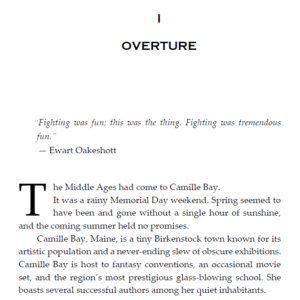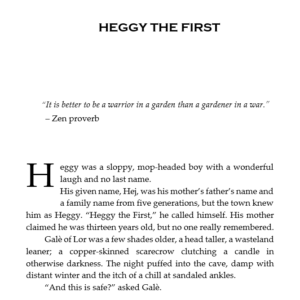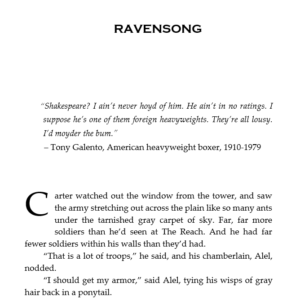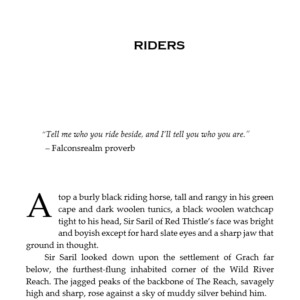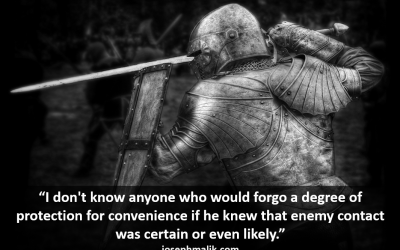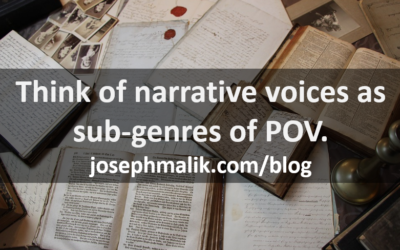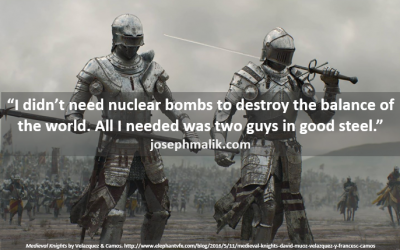Hey, it’s been a while.
I had the brilliant idea to start Book III right after releasing Book II, which gave me absolutely no time to do blog posts. The good news is that Book III sucked so bad in its first draft that I’m starting over with a blank page and taking a radically different angle of attack, which gives me some breathing room. Right now I’m back to sketching on legal pads.
I want to talk craft, today.
I was reading a thread this morning in a writer’s forum in which many of us discussed the use of chapter titles. It really came down to effectively a show of hands as to who uses them and who doesn’t, and while that was interesting, there wasn’t a lot of conversation about why we title or don’t title our chapters, or what chapter titles are for; really, it was just “I like titles,” or “I don’t like titles.” And that’s fine.
Personally, I put a lot of thought and work into my chapter titles, because I believe that chapter titles, when they’re used, are part of the structure of a novel. So, on that, I want to dig a little bit and talk some inside baseball about how I wrote The New Magic and how–and in some cases why–it’s different from Dragon’s Trail. I’ll try not to give any direct spoilers, but rather give some more sense of what you’re in for if you haven’t read The New Magic, or why I wrote it the way I did if you’ve already read it. I’m hoping, too, that this will help me kickstart a rewrite of Coin of the Realm, the first attempt of which died on the vine last week and has now been buried in the back forty under quicklime beside the first four drafts of The New Magic. I’ve found that examining my process out loud–or in print–helps me figure out exactly what the hell I’m trying to do, and I really need that right now. So, everybody benefits, here.
Titling chapters seems to be a dying fad among fantasy authors, but you know me; I’m old-school. Not only am I writing The Outworlders in omniscient third (the final book will likely be a framed narrative), but I start each chapter with a title and an epigram. I don’t think titles and epigrams are necessary in fantasy, but they’re stylistically consistent for me. Let’s talk about why.
In Dragon’s Trail, I used a Roman numeral and a classical-music form corresponding to the overall tone of the chapter: the opening scene on Earth, if you remember, was Overture; a chapter where Jarrod and Carter learned the same lesson in different ways was Rondo; the chapter with the big fight in the storeroom was Bourrée; and so forth. This was pretty easy with only 15 or so chapters. You may have noticed this, or perhaps you didn’t. It’s in there as an Easter egg; it’s not critical to your enjoyment of the story, but it’s load-bearing.
For the epigrams in Dragon’s Trail, I mostly used historical military quotes from Earth, because I was writing a portal fantasy and I wanted to show that A.) what Jarrod and Carter knew from study on Earth would benefit them in another world; and B.) my experience has been that the combat-professional’s mindset is startlingly consistent from nation to nation and would therefore likely be largely invariable throughout all of humanity, which is one of the themes of the series. I especially relied on quotes from ancient manuals of arms, since Jarrod is a fencer specializing in historic styles.
The New Magic, however, ended up as a different kind of book from its progenitor in many ways. Among many other things, it has twice as many chapters. This was necessitated by the narrative, as The New Magic takes place over 19 days, whereas Dragon’s Trail covers half a year; they arrive in spring and the fight at the bridge is in autumn.
I wanted to give the sense in The New Magic that everything is going wrong and it’s all happening too quickly for anyone to get a handle on, so I used short chapters and scenes and cut out a lot of the “fat”–there are no long descriptive traveling scenes, for instance. (This works for me on a personal level, because Holy HALO-jumping Jesus, I hate reading long traveling scenes with every damned blade of grass described in loving detail.) A lot of the imagery in The New Magic is conveyed simply: distant features, whether they be landscape elements or allegorical concepts, are often described in vague terms or simile, because the characters don’t have time to marvel at every cloud and mountaintop. The world is cartwheeling out of control, they caused it, and they’re only paying attention to what’s immediately around them because when you’re taking a reactionary approach to your own survival, this is what you do. This is in sharp contrast to Dragon’s Trail’s immersive and detailed descriptions, which are in line with Jarrod and Carter being in this new and stunning magical world where they innately understand much of what’s going on, and everything else merits close examination.
For The New Magic, I used more traditional types of chapter titles rather than sticking with classical-music forms, and I did away with the chapter numbering altogether. This is because it’s more of a traditional epic fantasy story than Dragon’s Trail, and also I wanted you, the reader, to A.) not know what was coming; and B.) not count the chapters. I wanted you to just barrel headlong through it.
A funny aside to this is that the books are 96,500 and 94,000 words in length, respectively, but a consistent comment is that The New Magic feels far shorter. It’s not; I wrote it to feel quick. I wanted you staring out into the sunset from the steps of Gateskeep Palace on the last page wondering how the hell that all just happened so fast and what’s coming next. I’ll make it up to you, I promise. Hold my beer; this is gonna be cool.
I also love love LOVE my chapter titles in The New Magic. Some of these titles may become books on their own when I do spinoffs, and yes, spinoffs are coming. Aever’s origin story is at least one book, and may merit a series; Daorah already has her own series loosely plotted with the working title By the Sword, which will dovetail into The Outworlders in a sort of Ender’s Shadow approach at points; and Galé of Lor is probably going to be the biggest part of this entire world’s history because he’s a warrior-mage who was making a living as a professional demon killer at the hand of an alien wizard king before he got rolled up into a world-wracking war and carved his name in the history books, and yet somehow he manages to be the Faramir of this whole thing when you watch it from Jarrod’s perspective. If I’d really been thinking this through, I’d have written the entire series centering on him.
The next thing from me, though, will be a series about a shadowy government agency running off-book ops into a corner of the world removed from The Outworlders saga; think of the Hawkins National Laboratory scenes in Stranger Things, except instead of demogorgons, you’ve got sheth waging a holy war against The Sparkly Door Ones. The first book in that series is probably coming out after Coin of the Realm, although I dream of writing them concurrently. Right now it’s just doodles in a small notebook and a few scenes in a folder marked NEW IDEA.
Take your time with that.
Moving on, and back to the initial point, I had a great time with the epigrams, especially in The New Magic. I really enjoy finding, creating, and applying epigrams. I had my chapters and epigrams mostly laid out by the second draft. In some points in my first draft, I had chapter titles and epigrams but nothing typed. I just knew from there what the scenes that followed were going to be.
Also, in The New Magic, I started creating epigrams from the fantasy world, which was something you didn’t see in Dragon’s Trail. Again, this was a way to show consistency of thought between their cultures, and to also bridge the gap further by suggesting that Jarrod and Carter were becoming inculcated in the ways of their new friends.
This Falconsrealm proverb ended up capturing so much of the theme of The New Magic that it became a contender for a tagline, and I used it in early advertising and promo, which some of you might remember: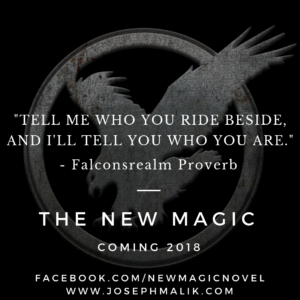
If you’ve read The New Magic, then you know that this quote starts the chapter after the prologue, so if you were following my social media back in March or so, and then when you were reading The New Magic six months later and came to that quote, the line serves as an azimuth check, of sorts.
It also allowed me to open The New Magic with a horror sequence that’s incongruous with anything you’ve seen from me so far. The proverb from Falconsrealm settles you into familiar surroundings, and then you see Saril, and a moment later, Bevio, and you get your bearings for a page or two before things start to get weird again.
So, to recap: I handled the chapter titles and epigrams differently between these two books because they are radically different books, although they’re obviously continuations of a story. I specifically built these books to feel distinct, and I used the titles and epigraphs to differentiate them. Again: maybe you noticed, maybe you didn’t.
If you’re an author, take a long look at your chapter titles or lack thereof. Do you need them? Some of us do, some of us don’t. If you’re using them, are they doing what you need them to? Do you want to give your readers a nudge? Do you need a nudge?
And I still have no idea what the hell I’m going to do with this new draft of Coin of the Realm, so I just killed three hours. This counts toward my daily word count, right?
Right?
Yeah. Back at it.



